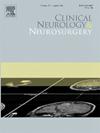Lumbar puncture tap test in iNPH: Does extracting different volumes of CSF change the clinical response?
IF 1.8
4区 医学
Q3 CLINICAL NEUROLOGY
引用次数: 0
Abstract
Introduction
Although the Lumbar Tap Test (LTT) typically involves removing 30–50 ml of cerebrospinal fluid (CSF), the optimal amount for a valid test is unclear. This study investigates the relationship between the volume of CSF removed and the extent of gait improvement in idiopathic normal pressure hydrocephalus (iNPH).
Methods
Seventy-six iNPH patients with gait improvement after LTT were divided into two groups: high CSF volume (> 40 ml) and low CSF volume (< 40 ml). Spearman’s r correlations and non-parametric t-tests were used to analyze the relationship between CSF volume removed and gait improvement.
Results
Gait improvement after LTT showed a moderate positive correlation (r = 0.372, p < 0.001) with CSF volume. Those in the high-volume group had significantly greater improvement (p < 0.01). Improvement was also correlated with baseline gait parameters: pre-LTT gait speed (r = −4.14, p = 0.006), steps to complete a walking test (r = 0.440, p < 0.001), and a 360° turn (r = 0.563, p < 0.001).
Conclusions
Larger CSF removal during LTT positively affects gait improvement in iNPH patients. Gait improvement is also greater in those with more severe initial gait impairments independently from the CSF volume extracted.
iNPH 的腰椎穿刺抽取试验:抽取不同体积的 CSF 会改变临床反应吗?
导言尽管腰椎穿刺试验(LTT)通常需要抽取 30-50 毫升脑脊液(CSF),但有效试验的最佳抽取量尚不明确。本研究探讨了特发性正常压力脑积水(iNPH)患者脑脊液抽出量与步态改善程度之间的关系。方法将 76 例经腰椎穿刺试验后步态改善的 iNPH 患者分为两组:高脑脊液量组(> 40 ml)和低脑脊液量组(< 40 ml)。结果 LTT 后步态改善与 CSF 容量呈中度正相关(r = 0.372,p < 0.001)。高容量组的改善幅度明显更大(p < 0.01)。改善情况还与基线步态参数相关:LTT 前步态速度(r = -4.14,p = 0.006)、完成步行测试的步数(r = 0.440,p <0.001)和 360° 转体(r = 0.563,p <0.001)。结论LTT时抽取更多的CSF对iNPH患者的步态改善有积极影响,而与抽取的CSF量无关,步态改善对初始步态障碍更严重的患者影响更大。
本文章由计算机程序翻译,如有差异,请以英文原文为准。
求助全文
约1分钟内获得全文
求助全文
来源期刊

Clinical Neurology and Neurosurgery
医学-临床神经学
CiteScore
3.70
自引率
5.30%
发文量
358
审稿时长
46 days
期刊介绍:
Clinical Neurology and Neurosurgery is devoted to publishing papers and reports on the clinical aspects of neurology and neurosurgery. It is an international forum for papers of high scientific standard that are of interest to Neurologists and Neurosurgeons world-wide.
 求助内容:
求助内容: 应助结果提醒方式:
应助结果提醒方式:


